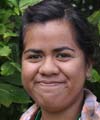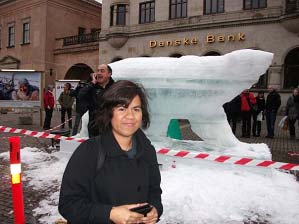Tiempo Climate Cyberlibrary
Interview with Erana Walker
- Tiempo archive
- Complete issues
- Selected articles
- Cartoons
- Climate treaty
- Latest news
- Secretariat
- National reports
- IPCC
About the Cyberlibrary
The Tiempo Climate Cyberlibrary was developed by Mick Kelly and Sarah Granich on behalf of the Stockholm Environment Institute and the International Institute for Environment and Development, with sponsorship from the Swedish International Development Cooperation Agency.
While every effort is made to ensure that information on this site, and on other sites that are referenced here, is accurate, no liability for loss or damage resulting from use of this information can be accepted.
 |
In a Newswatch interview, Erana Walker talks of her expectations of the Copenhagen climate summit in December 2009 and about her experience of climate action at the community level. |
| Erana Walker attends Te Kura Kaupapa Maori O Te Rawhitiroa, a total immersion Maori-language school active in the Enviroschools programme. She is representing New Zealand as a UNICEF Kiwi Climate Ambassador at the UNICEF Children's Climate Forum in Copenhagen at the time of the climate summit. | |
Tiempo Climate Newswatch: Erana, congratulations on being selected as a Kiwi climate ambassador. What are your hopes for the international climate summit that will take place just after your forum in Copenhagen?
Erana Walker: My hope for the conference is that we get the results that are going to make a difference and that are necessary. I hope we all pull ourselves together and start doing things properly!
Tiempo Climate Newswatch: Should we place our trust in politicians to deal with the climate problem?
Erana Walker: To me, we shouldn't rely heavily on politicians because, at the end of the day, as individuals we have the power to take action and make a difference. By relying too much on politicians we will end up getting more and more frustrated.
Tiempo Climate Newswatch: How seriously do people around you take the climate problem? Are they aware of the threat?
Erana Walker: Some are, some aren't, that's the whole point of what I'm trying to achieve. I want to get them knowing more about the threat of climate change and to taking it more seriously.
Tiempo Climate Newswatch: What do you see as the main risks faced by your homeland of Northland, New Zealand?
Erana Walker: There are a lot of threats to Northland that are caused by climate change. Most recently, they can be seen in a change in the weather. We are getting heavy rainfalls more often than before and these obviously lead to more floods. This will have an impact on our rivers and on our food produce as is it gets harder to grow because it's too wet.
| The UNICEF Children’s Climate Forum |
|---|
|
The purpose of the UNICEF Children’s Climate Forum was for the 164 youth delegates from across the world to produce a declaration to send to the world leaders who were attending the Copenhagen climate summit. The declaration was intended to help world leaders make decisions on what to do, by putting forward ways of helping tackle climate change. It was later given to Connie Hedegaard, the president of the summit. On adaptation, the delegates recommended that industrialized countries ramp up spending on adaptation, that cities be well planned and sustainable, that safety standards, regulations and emergency protocols be established to prepare for climate induced disasters and that better water conservation be practised. On mitigation, it was recommended that research, development and sharing of green and energy-efficient technologies must occur between industrialized and developing countries to ensure sustainable development globally, that investments should be made in sustainable transport infrastructure, and that an international carbon trading system should be introduced with all transactions within the market should be taxed and the revenue generated used for an adaptation fund. A new classification was proposed to distribute responsibilities fairly among nations wherein countries are divided into three annexes: the industrialized countries, the developing countries which pollute heavily and the less polluting developing countries. The delegates also recommended that governments should establish and develop recycling systems on a national level and demanded that authorities provide accessible recycling facilities in all communities. Finally, the delegates recommended that climate change education should be a mandatory and substantial area of the school curriculum and that governments should also support organizations which already educate youth on climate issues. Education on sea-level rise and flooding and biodiversity-related projects should be provided. The declaration ends with the following words to the politicians gathered in Copenhagen: "The battle against climate change is upon all of us. We are ready to act and we invite you to join us. Climate change is affecting our lives, our families and our future. We must act immediately and we are ready to fulfil our commitments. We are prepared to give all we have as long as there is the possibility of saving our planet. We expect the same courage from you." |
Tiempo Climate Newswatch: Do you feel that your community is well-placed to fight the impacts of climate change?
Erana Walker: I have worked alongside my community for so long that I definitely think we can take action on climate change!
Tiempo Climate Newswatch: What would you like to see your community do to get organized?
Erana Walker: Work together! The stronger our relationships with each other become the more more we will be able to achieve.
 |
Erana Walker in Copenhagen, beside a polar bear ice sculpture made to demonstrate that there's very little time left to save the bears because the Arctic is melting |
Tiempo Climate Newswatch: You've been very active in protecting your local environment. What environmental problems have you and your school been tackling?
Erana Walker: For the past five years, me and my school have been working on a river restoration project. It's been a long journey but we have learnt so much from it. We've been holding community awareness days to get people aware of what's happening to our water ways. We have had planting days to get people making a difference and we even held a 350 Aotearoa Festival, focused around climate change. All this from one river project!
Tiempo Climate Newswatch: Tell me more about the 350 Aotearoa Festival… did you get a lot of people there and what's going to happen next?
Erana Walker: The 350 festival was held to inform people about climate change and its effects. We did have a lot of people come ranging from babies to our elderly. We took a photo of the banner that we made and are now hoping to send it through to the 350 website where it will be taken to Copenhagen.
Tiempo Climate Newswatch: Thank you very much for your time, Erana, and good luck with your future work.
A request
Erana Walker has been nominated and selected to attend the Global Young Leaders Conference in China, June 29th-July 8th 2010. Sponsorship is needed and any suggestions for support would be gratefully appreciated. Please contact Jodi Walker for further information.
On the Web
All the delegates who attended the UNICEF Children's Climate Forum are able to keep in contact with each other on the United For Climate website where there is more information about the meeting's events and activities.
Bright Ideas

General Electric plans to cut solar installation costs by half

Project 90 by 2030 supports South African school children and managers reduce their carbon footprint through its Club programme

Bath & North East Somerset Council in the United Kingdom has installed smart LED carriageway lighting that automatically adjusts to light and traffic levels

The United States National Oceanic and Atmospheric Administration and the American Public Gardens Association are mounting an educational exhibit at Longwood Gardens showing the link between temperature and planting zones

The energy-efficient Crowne Plaza Copenhagen Towers hotel is powered by renewable and sustainable sources, including integrated solar photovoltaics and guest-powered bicycles
El Hierro, one of the Canary Islands, plans to generate 80 per cent of its energy from renewable sources

The green roof on the Remarkables Primary School in New Zealand reduces stormwater runoff, provides insulation and doubles as an outdoor classroom

The Weather Info for All project aims to roll out up to five thousand automatic weather observation stations throughout Africa

SolSource turns its own waste heat into electricity or stores it in thermal fabrics, harnessing the sun's energy for cooking and electricity for low-income families

The Wave House uses vegetation for its architectural and environmental qualities, and especially in terms of thermal insulation

The Mbale compost-processing plant in Uganda produces cheaper fertilizer and reduces greenhouse gas emissions

At Casa Grande, Frito-Lay has reduced energy consumption by nearly a fifth since 2006 by, amongst other things, installing a heat recovery system to preheat cooking oil
Updated: May 15th 2015